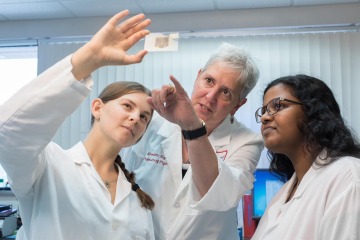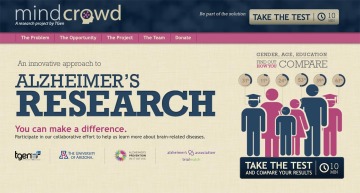Researchers Investigate How COVID-19 Impacts the Brain
The project leverages MindCrowd, an existing online survey tool that researchers use to investigate risk factors for Alzheimer's disease.

The coronavirus is well known for attacking the lungs and causing coughing fits, difficulty breathing, fever and even deadly pneumonia. But what does it do to the brain?
A study led by Lee Ryan, PhD, professor and head of the University of Arizona Department of Psychology in the College of Science, aims to find out.
Dr. Ryan is working with Meredith Hay, PhD, a professor in the College of Medicine – Tucson and member of the BIO5 Institute, co-principal investigator Matthew Huentelman, PhD, a research associate professor at the College of Medicine – Phoenix, and John Altin, PhD, an assistant professor in Translational Genomics Research Institute’s (TGen) pathogen and microbiome division.

Meredith Hay, PhD (center), a professor of physiology, is also a member of the BIO5 Institute and the Evelyn F. McKnight Brain Institute. (Chris Richards)
Earlier coronaviruses have been shown to make their way from the lungs and nose – where the viruses live and breed – and into the brain through nerves that connect to the brainstem or directly to the brain. Some COVID-19 patients have shown neurological symptoms such as nausea, vomiting, headache and a loss of taste and smell.
“Because there are receptors for CoV-2 in the brain, we’re interested in knowing if there are any long-term effects of exposure to COVID-19 on neurological function,” said Dr. Hay, whose research focuses on the effects of inflammation and chronic diseases on cognitive function and memory.
The study involves using MindCrowd to find 2,000 people who have had COVID-19 or have recently shown symptoms of the virus. MindCrowd is a research project launched in 2014 by Drs. Ryan and Huentelman to better understand the risk factors for Alzheimer's disease.

Information gathered through the online platform MindCrowd enables researchers to look at possible relationships between genetics and demographic or environmental factors, including a COVID-19 diagnosis.
"Drs. Ryan and Huentelman's innovative MindCrowd platform is perfectly positioned for rapid global deployment to investigate the impact of COVID-19 on brain function and risk of Alzheimer's disease," said Roberta Diaz Brinton, PhD, director of the UArizona Center for Innovation in Brain Science, which is funding the project.
About 140,000 people have participated in an online memory test on the MindCrowd website. Of those, roughly 50,000 have completed a battery of cognitive tests related to memory and processing speed and agreed to remain in contact with the researchers for additional studies.
"Most studies requires large numbers to determine association. Through MindCrowd, we’re able to assess, online, any connection between COVID-19 and your cognitive function, much more readily than you ever could do in person,” Dr. Hay said.
Those 50,000 participants have now received surveys asking whether they've had COVID-19 symptoms over the past several months, been diagnosed with the virus or tested negative for it. The 2,000 participants with the highest likelihood of having had the virus will be asked to complete cognitive tests that check aspects of their memory, executive functions, processing speed and more, which can be compared with prior MindCrowd tests.

Although it originated before the age of physical distancing, MindCrowd’s online platform conveniently allows people worldwide to participate in research on brain-related diseases from home.
They will also receive a test kit to obtain a blood sample from a finger prick, which will then be mailed back to the researchers. TGen scientists will test the blood samples for antibodies, which will tell researchers who has or hasn’t been exposed to the coronavirus.
"This is really fundamental research that will apply precision medicine to our understanding of cognitive aging," Dr. Hay said. "With enough data from the participants involved in the MindCrowd study, we hope to be able to create individualized tools that can intervene where needed and preserve high cognitive function across the lifespan.”
“We may discover that having a positive diagnosis of COVID-19 could have an impact on your cognitive health, even if you were asymptomatic,” Dr. Hay continued. “Perhaps there’s an anti-inflammatory drug you could take that would actually improve your cognitive function and decrease the inflammatory profile that was induced by the coronavirus.”
The study, researchers hope, will be the start of a more comprehensive investigation of the effects of coronavirus on the brain, which requires following subjects over several years to study changes as they age.
Contact
Health Sciences
Office of Communications
520-626-7301
public@email.arizona.edu

